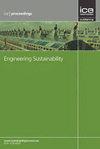A dialectical system framework for enhancing the modular construction supply chain
IF 1.5
4区 工程技术
Q3 ENGINEERING, CIVIL
Proceedings of the Institution of Civil Engineers-Engineering Sustainability
Pub Date : 2023-10-05
DOI:10.1680/jensu.23.00039
引用次数: 0
Abstract
Modular construction (MC) is an innovative approach to enhancing productivity and sustainability, but its complex and dynamic supply chain is challenging. This paper develops and validates a dialectical system framework for understanding and enhancing the MC supply chain, through the combination of a literature review, interviews with 59 professionals and a case study of modular integrated construction development in Hong Kong, China. The developed framework encompasses seven key components of the MC supply chain technical system – namely, pre-approval, building plan pre-submission, detailed design, module production, logistics, module installation, and quality assurance and quality control – considering various stakeholders embedded in broader contexts. The case study validates the framework as a theoretical lens to comprehend the complex MC supply chain and as a novel analytical model to enhance the MC supply chain from different stakeholder and contextual perspectives. Future research directions are suggested regarding strategy establishment, performance measurement and policy road map development to achieve a mature and sustainable supply chain.构建模块化建筑供应链的辩证体系框架
模块化结构(MC)是一种提高生产力和可持续性的创新方法,但其复杂和动态的供应链是具有挑战性的。本文通过文献综述、对59位专业人士的访谈以及对中国香港模块化集成建筑发展的案例研究,开发并验证了一个理解和增强MC供应链的辩证系统框架。开发的框架包括MC供应链技术系统的七个关键组成部分,即预先批准、建筑计划预先提交、详细设计、模块生产、物流、模块安装、质量保证和质量控制,并考虑到更广泛背景下的各种利益相关者。案例研究验证了该框架作为理解复杂的MC供应链的理论视角,以及作为从不同利益相关者和上下文角度增强MC供应链的新颖分析模型。在战略制定、绩效衡量和政策路线图制定等方面提出了未来的研究方向,以实现供应链的成熟和可持续发展。
本文章由计算机程序翻译,如有差异,请以英文原文为准。
求助全文
约1分钟内获得全文
求助全文
来源期刊

Proceedings of the Institution of Civil Engineers-Engineering Sustainability
ENGINEERING, CIVIL-ENGINEERING, CIVIL
CiteScore
3.70
自引率
16.70%
发文量
44
审稿时长
>12 weeks
期刊介绍:
Engineering Sustainability provides a forum for sharing the latest thinking from research and practice, and increasingly is presenting the ''how to'' of engineering a resilient future. The journal features refereed papers and shorter articles relating to the pursuit and implementation of sustainability principles through engineering planning, design and application. The tensions between and integration of social, economic and environmental considerations within such schemes are of particular relevance. Methodologies for assessing sustainability, policy issues, education and corporate responsibility will also be included. The aims will be met primarily by providing papers and briefing notes (including case histories and best practice guidance) of use to decision-makers, practitioners, researchers and students.
 求助内容:
求助内容: 应助结果提醒方式:
应助结果提醒方式:


